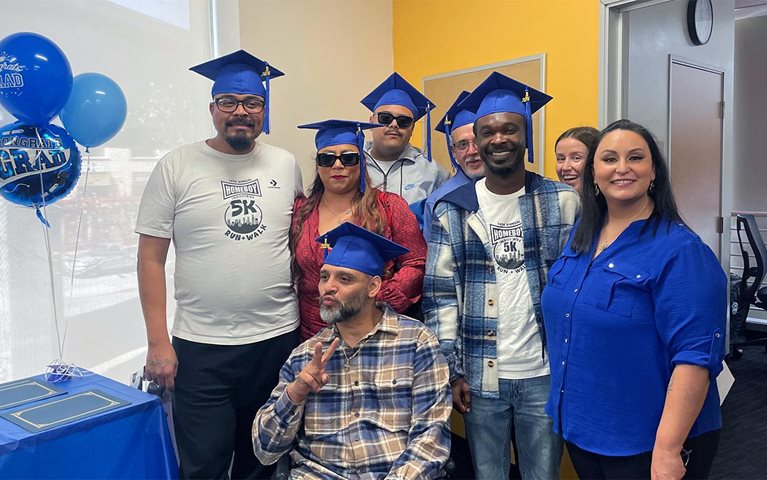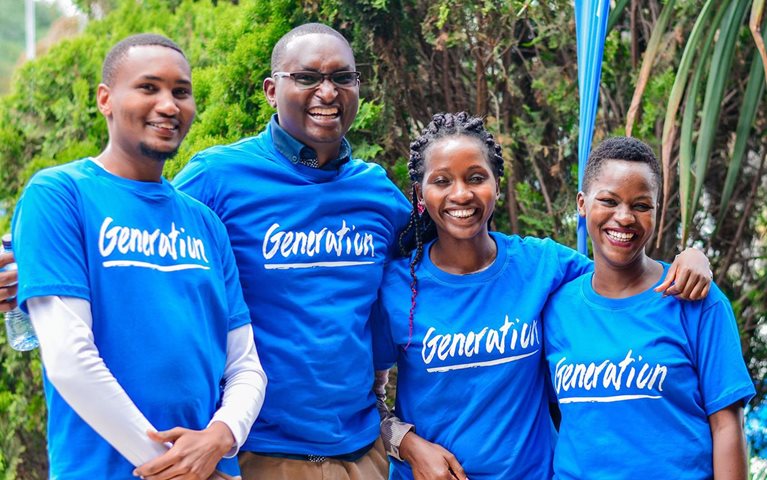McKinsey’s Connected Leaders Academy (CLA) began when the firm saw a unique opportunity to expand access to leadership development for rising talent across industries.
“Organizations make the most difference when they lean on their core strengths, and for McKinsey one of those strengths is leadership development,” says Sara Prince, senior partner and a founder of CLA. “We crafted a program from the best of our firm’s offerings and made it accessible to leaders from a wide range of backgrounds.”

The program’s human-centered approach provides participants an opportunity to connect identity, authenticity, and leadership, as well as spaces for peer learning and discussion, some of which may be particularly relevant in the context of Black, Hispanic and Latino, and Asian identities. CLA welcomes any participant an organization selects for the programs.
CLA launched in 2020 with programs designed for managers and executives, and two years later added a program designed for early-career professionals. To date, CLA has engaged over 100,000 participants from over 1,300 organizations, spanning a wide variety of industries.
As we celebrate CLA’s five-year anniversary, we reflect on the key insights from these leadership development journeys on identity, peer learning, and sponsorship.
Understanding identity strengthens leadership
CLA participants explore how their various identities contribute to how they show up in the workplace, something many say they’ve never done previously. Through conversation and reflective exercises, participants discover how different aspects of their identity—such as family background, education, race, gender, and neurodiversity—affect their leadership approach.
During one exercise, a participant spoke about being “proudly neurodivergent.”
“My ADHD gives me different ways to look at problems and increased empathy and patience with my team members,” he said. “In the program, I started seeing this as a superpower instead of something to hide.”
The identity exercise also helped participants see areas where they could continue to grow.

“I saw that my identities as a mom, dutiful daughter, and woman of faith caused me to be too much of a caretaker and people pleaser, including at work,” said a participant. “This was probably there in the back of my mind but never addressed until this program.”
The identity exploration resonated with participants, with 75 percent saying the program helped them understand their identity, and 91 percent saying understanding their identity made them a better leader.
“Your skills and knowledge are table stakes,” says Ashley Thomas, senior expert at McKinsey. “We discovered that leaders who are willing to dig deeper to understand themselves are able to lead more authentically, putting them in a stronger position to drive performance in their organizations.”
The ‘secret sauce’ of peer learning
The identity work is possible because of the openness of the participants, whose diversity of experience is a key strength of the program. Over half of participants reported that peer learning was a contributing factor to their career progression.
“The secret sauce of CLA is the group of people that we’re able to bring together in each cohort—and have these honest conversations with each other,” says Adrian Kwok, McKinsey associate partner.
CLA maximized the impact participants had on each other’s development through intentional connections and networking, with 75 percent of respondents across programs reporting networking as a skill they confidently and frequently applied post-program.
“If you’re a pharma executive, you might go to a pharma conference each year and see your pharma peers. But will you have an opportunity to meet people from the nonprofit, banking, real estate, or consumer sectors?” Adrian says. “CLA creates a well-rounded environment where people become familiar with engaging people from different sectors and experiences.”
A participant shared, “I was able to learn not just about my own industry and in my own department, but how others approach similar challenges. It gave me new frameworks and perspectives.”
To grow participants’ internal company networks, the program offered digital small-group coursework with peers from their own organizations across tenure levels.
A groupwork participant shared, “I work with people in my organization in a lot of different functions. Even though it’s been over a year since we’ve finished the program, we’re able to make decisions a lot faster because we have these different connects with teams that traditionally we wouldn’t talk to.”
Three key learnings
Sponsorship has to be intentional
McKinsey research has proven that having a sponsor to support professional advancement is crucial to success. But companies aren’t always delivering the sponsorship they think they are: 87 percent of research-participating companies believed they have sponsorship programs in place, but more than 60 percent of surveyed leaders said they don’t actually have a sponsor.
To address this disconnect, CLA’s executive leaders program took an active approach to sponsorship, requiring organizations to provide a sponsor for program participants, and using program content to set expectations and foster an open dialogue on effective sponsor relationships.
“Sponsors are advocates for their sponsorees and it takes effort and intentionality to build a meaningful understanding of how to support someone,” says Ankur Kumar, director of learning for CLA. “Like all relationships, this is reciprocal, so it’s important for sponsorees to think about what they are bringing into the equation and be proactive and clear on their asks.”
Many sponsors identified for the program didn’t have experience as sponsors and reported that the guidance offered by CLA made a difference in their effectiveness.
The chief people officer at an electronics company said, “I’ve had the opportunity to get to know top talent more deeply, learn from them, and accelerate their career development, and these relationships continued long after the program.”
The next five years and beyond
Demand for this type of leadership development remains high, including from participants, with more than 53,000 participants engaging in NEXT, CLA’s alumni programming. McKinsey is continuing to expand CLA offerings, including the launch of a program in Brazil and People Leadership Edge, a new 12-week course, which moves beyond leaders' personal development to help them create environments where everyone can use their full breadth of experiences to improve team performance.
“I’m excited about how we’ll use different modalities and technology to accelerate this work,” Sara says. “In the midst of this continuous change, the fundamentals of leadership development and excellence will be embedded in all we do.”

